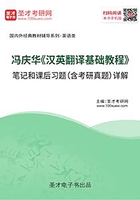
5.3 翻译示例汇总
一、数词的翻译
例1:保持原来的数字不变
(1)你好像一夜之间长高了十英寸。
【译文】You act as if you grew ten inches in the night·
【解析】英汉两种语言中都经常用“十、百、千”及其倍数作为一种夸张的修辞手段来增强语言表达的气势,表示“极多、极大、极高”等语义。原句中的“十”表达的就是这样一个意思,因而在翻译时,直译便可。
(2)将军百战死,壮士十年归。
【译文】Generals laid down their lives in a hundred battles; and valiant soldiers returned after ten years’ service.
【解析】这个例句同上个例句一样,“百战”译为a hundred battles、“十年”直译为ten years即可,而且语言表达也很生动、形象、有力。这种数字上的语用对等性使得翻译时常可采用直译,并保持原文的韵味和气势。
(3)你故意淹死两千二百小工,每一个小工的性命你扣三百钱。(曹禺《雷雨》)
【译文】You drowned two thousand two hundred cooties in cold blood, and for each life, you raked in three hundred dollars.
【解析】这个句子中,“两千两百小工”和“三百钱”都是具体准确的数字,在翻译时要做到忠实,完全照原文意思来翻。
(4)一两的幸运胜过一斤的智慧。
【译文】An ounce of luck is better than a pound of wisdom.
(5)一寸光阴,一寸金。
【译文】An inch of time is an inch of gold.
【解析】例(4)和例(5)中的“一”是发挥计数以外功能的数词,表示比喻、夸张、反复、层递等修辞概念,只要是汉英两种语言都加以使用的,译后不影响理解的,一般都可以采取照数直译的办法。其中最常见的是“十、百、千、万、百万”与ten,hundred,thousand,ten thousand,million之间的对译。当然,量词可能会发生改变,如例(4)中的“两”和“斤”转变为英语中同样用来表示重量的ounce和pound;例(5)中的“寸”也译为了inch。虽然实际上这些度量衡并不能对等,但因为并不表示具体的重量和尺度,只要语用功能上达到对应,也就可以了。
例2:
几个some;a few;several;a number of
十几个more than ten;no more than twenty
几十个dozens of
几十年decades
七十好几了well over seventy
好几百个hundreds of
成千上万thousands of
几十万hundreds of thousands of
亿万hundreds of millions of
例3:改变原来的数字
(1)他买了24本杂志。
【译文】He has bought two dozen magazines.
【解析】如果将“24本杂志”译成twenty-four magazines则存在着表达不够地道的问题。
(2)500年来,中国的戏剧有了很大的发展。
【译文】The past five centuries witnessed great development in Chinese drama.
【解析】如果将“500年”译成five hundred years也存在着表达不够地道的问题。
(3)他的数学分数在班上是名列前茅的。
【译文】His mark in math is second to none in this class.
(4)每次我们闲聊,他十有八九都谈及你。
【译文】He talks about you nine times out of ten when we have a chitchat.
(5)三五中秋夕,清游拟上元。(曹雪芹《红楼梦》)
【译文】Mid-autumn’s fifteenth night is here again. As on the feast of lanterns we stroll round.
【解析】该句中“三五”是一个析数,即使把“十五”拆分开来的,要照搬字面是不可能行得通的,只能意译。
例4:
(1)这是你第几次来中国?
【译文】Is this your first visit to China?
(2)你们队得了第几名?
【译文】Did your team win the championship?
(3)这孩子是你的老几啊?
【译文】Is this your oldest/ youngest child/ son/ daughter?
例5:
(1)一日之计在于晨。
【译文】One hour in the morning is worth two in the evening.
(2)三思而后行。
【译文】Look before you leap.
(3)一石二乌/一箭双雕/一举两得
【译文】to kill two birds with one stone
【解析】上面例句中原文是我们熟悉的汉语习语和俗语,它们都牵涉到了数字的问题。在翻译这类习语的时候,能套译的尽量套译。在上面的译文中,都套用了英语习惯的表达方式。
(4)普及工作若是停留在一个水平上……那么教育者和被教育者岂不都是半斤八两?(毛泽东《在延安文艺座谈会上的讲话》)
【译文】If popularization remains at the same level for ever ... will not the educators and those being educated be six of one and half a dozen of the other?
【解析】“半斤八两”是一个典型的汉语习语,而在英文中的six of one and half a dozen of the other正好与“半斤八两”字面意义和蕴涵意义基本一致,这种套译方式能更好地为外国读者接受。
例6:
◇六街三市downtown area
◇六亲all one’s relatives and friends
◇六畜the domestic animals
◇五光十色multicolored
◇万紫千红a riot of color
◇一诺千金a promise that will be kept
◇九死一生a narrow escape from death
例7:省略数词
(1)等他们赶来增援时,已是“正月十五贴门神,晚了半月啦”。(冯至《敌后武工队》)
【译文】But they were too late for a rescue.
(2)此地无银三百两。
【译文】A guilty person gives himself away by conspicuously protesting his innocence.
(3)那大汉已有七八分醉……(施耐庵《水浒传》)
【译文】Now the robber chief was already half-drunken.
(4)现在,我十分愿意回答诸位关心的问题。
【译文】Now, I feel more than happier to answer some questions that you are concerned about.
(5)有些国营商店的售货员态度冷若冰霜,拒人千里之外。
【译文】Shop assistants in some state-owned shops are frosty in manner, repelling customers from a distance.
二、活用英语冠词
例1:
(1)我有权要求你对你的话作一番解释。
【译文】I have a right to demand an explanation of your words.
【解析】“解释”这个抽象名词对应的英文是explanation,前面加不定冠词an对解释的范围做了限定。
(2)与某人进行一场辩论
【译文】have an argument with sb.
【解析】上述两例中的“一番解释”“一场辩论”中表示“一次”行为,因而在翻译成英文时,对应的名词explanation、argument前也要加不定冠词an,以表示次数。
(3)气温突然下降。
【译文】There was a sudden fall in temperature.
(4)城里发生了麻疹病。
【译文】There has been an outbreak of measles in town.
【解析】原文中“下降”“发生”都是动词,但是译为英语中比较倾向使用的名词时,原本隐含在汉语上下文中的“一场”“一阵”这类的概念,就需要明晰化处理,用英语的不定冠词a/an来表示。
例2:
(1)一种宁静的幸福充满了他的心田。
【译文】A serene happiness filled his heart.
【解析】“幸福”是一个品质名词,在翻译成英文时,对应成了happiness,而这个词是由英文中的形容词happy转化而来的,在前面要添加不定冠词表示部分意义。
(2)这(一种)病得了之后会使你虚弱数月。
【译文】Such a sickness leaves you weak for months afterwards.
【解析】“病”对应的是sickness,这个名词也是由形容词转换而来的,在前面添加不定冠词表示部分意义。
(3)他干工作有(一种)惊人的坚忍不拔的毅力。
【译文】He did his work with a perseverance that was truly amazing.
【解析】“毅力”是一个抽象名词,前面用“一种”来修饰,在翻译成英文时,“毅力”对应的是perseverance,并在前面加上了不定冠词a,表示部分意义。当然,汉语原文中并不一定指明“一种”,需要译者去细细体会,并补足隐含的意思。
例3:
(1)百岁以上的人是少见的。
【译文】A man over a hundred years old is a rarity.
(2)一个在两岁就能弹钢琴的孩子可被称为(一个)非凡的人。
【译文】A child who can play the piano at the age of 2 would be called a phenomenon.
(3)这种带有红黄纹路的贝壳真是(一件)稀奇物。
【译文】This red and yellow striped seashell is quite a curiosity.
例4:
(1)他是我们学校的(一位)英语教师。
【译文】He’s an English teacher at our school.
【解析】译文中的an在这儿指“指人或事物中的某一种类”,从而用这种方式来代替整个类属。
(2)票据人在受到另一银行询问时,应对某一顾客的地位和身份提出意见。
【译文】A banker will give an opinion on the standing of a customer if he is asked to do so by another bank.
【解析】“票据人”在这里指的是一类人,因而译文中要添加不定冠词a,表示某一类中的人或物。
例5:
(1)这起犯罪行为很快就被发现了。
【译文】The crime was soon discovered.
(2)犯罪行为在增加。
【译文】Crime is increasing.
【解析】(1)中“这起犯罪行为”是特指某一具体的犯罪行为,因而在crime前加了定冠词the表示特指,这时的crime的行为也变得很具体;而在(2)中,“犯罪行为”是一个泛指的概念,不能在前面加定冠词。
(3)你觉得这音乐怎样?
【译文】What do you think of the music?
(4)他的工作是制作音乐。
【译文】His work is to compose music.
【解析】(3)中的“这个音乐”明显是特指,已经具体到某一个音乐作品上;而(4)中的“制作音乐”是一个泛指的概念,指的是任何一种音乐形式。
例6:
这种场景会很悦目的。
【译文】The scene will please the eye.
【解析】原文中的“很悦耳的”是指听觉上抽象的概念,在翻译成英文的时候,要在视觉器官eye前加the表示这一抽象概念。
例7:
(1)汤姆非常喜欢喝酒。
【译文】Tom is too fond of the bottle.
【解析】“喝酒”在此处的对应译文是bottle,而在这一工具名词前加the则表示与这一名词有联系的抽象概念,转指“酒”。
(2)从生到死
【译文】from the cradle to the grave
【解析】这也是一处妙译。用cradle(摇篮)来表明“生”之义,用grave(坟墓)来表示“死”之义,比直译from birth to death有韵味。
例8:
(1)太阳从东方升起。
【译文】The sun rises in the east.
(2)他是第一个到达那儿的人。
【译文】He was the first to reach there.
(3)小明是他的班上最高的学生。
【译文】Xiao Ming is the tallest in his class.